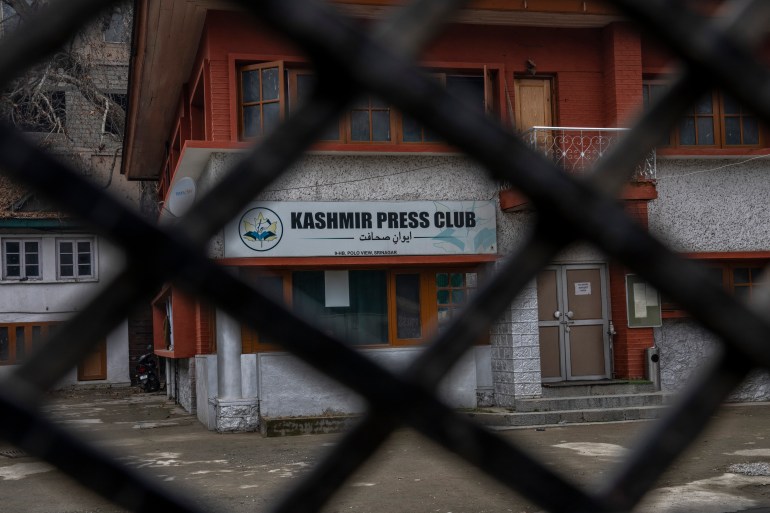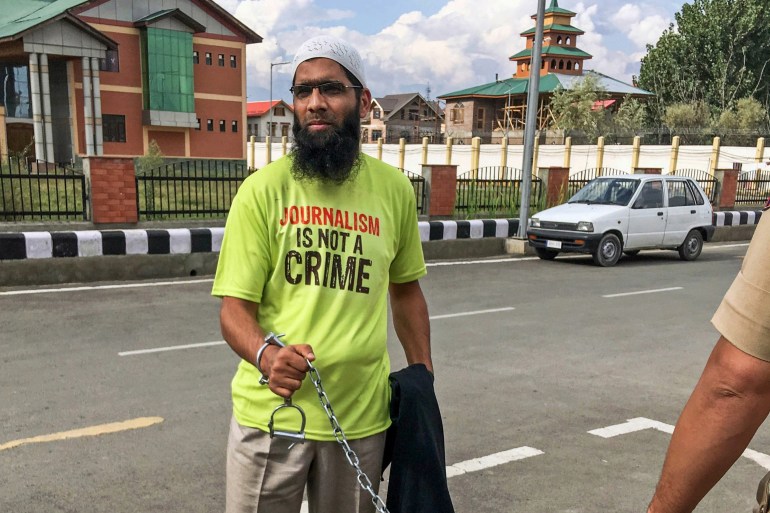Outrage as another Kashmiri journalist stopped from flying abroad | Freedom of the Press News
Yet another Kashmiri journalist has been stopped by the Indian authorities from flying abroad as outrage grows over a continuing clampdown on press freedom in Indian-administered Kashmir and its residents.
Independent journalist Aakash Hassan, 25, was on his way to Sri Lanka for a reporting assignment last week when immigration officials at New Delhi airport barred him from boarding the flight, making him the fourth Kashmiri journalist in about a year to face the action.
“I got my boarding pass and when I was at the immigration, I was told to wait at the side,” Hassan told Al Jazeera.
“Then I was taken to a room and interrogated by two people who did not identify themselves. They asked me what kind of journalism I do. They asked about my background,” he said.
Hassan said the interrogation continued for five hours.
“My passport and boarding pass were stamped with ‘Stopped without prejudice’ and my luggage was offloaded,” said Hassan, who also shared pictures of the stamping on Twitter.
The immigration officials, Hassan said, did not provide any justification for why he was stopped.
“They said there was a lookout circular issued on my name but they denied disclosing which agency had issued it,” he said.
A lookout circular is issued by India’s law enforcement agencies to stop an individual – either absconding or wanted – from leaving the country. It is mostly used at immigration checkpoints at international airports.

‘Targeted for our work’
Hassan said there is no criminal case against him.
“The worst thing is I don’t know who I should approach. This is going to take a mental toll on me. We are being targeted for our work,” he told Al Jazeera.
“It is going to jeopardise my future.”
Kashmiri journalists say issuing of lookout circulars against them and stopping them from international travel is a new trend.
Last month, Pulitzer Prize-winning Kashmiri photojournalist Sanna Irshad Mattoo was prevented from flying to Paris for a photo exhibition.
“I was shocked and heartbroken,” the 28-year-old then told Al Jazeera, adding that she, like Hassan, did not have a criminal case against her.
Mattoo, a contributor to the Reuters news agency, was part of a four-member team of photojournalists that won the Pulitzer last year for their coverage of the COVID-19 crisis in India.
Last year, two other Kashmiri journalists – Zahid Rafiq and Ruwa Shah – were barred from flying abroad.
In 2019, independent journalist Gowhar Geelani was stopped at New Delhi airport when he was on his way to Germany to join a job.
There have been similar examples from outside Kashmir as well.
In April this year, Aakar Patel, former head of Amnesty International in India, said he was stopped from flying to the United States because of a criminal case filed against the rights body. Authorities said Patel was on a “lookout circular” issued by India’s Central Bureau of Investigation.
Days before that, prominent Indian journalist Rana Ayyub was also stopped from boarding a flight to London where she was scheduled to address a press event. She was allowed to fly five days later after she approached a court of law.
Some Kashmiris allege their passports were not being renewed by the Indian authorities.
“The passport verification process has been pending for more than six months,” a 30-year-old Kashmiri journalist who did not want to be identified told Al Jazeera.
‘Systematic pattern of harassment’
Kashmiri academics and journalists studying or working abroad say they fear visiting home over the risk of being barred from flying back.
“They [authorities] have used all kinds of means to harass journalists, questioning them, harassing families, arrests and now stopping them from going out of India is a new challenge,” Kashmiri journalist Ahmad who did not want to be identified by his first name told Al Jazeera.
“With each day, doing journalism in Kashmir is becoming impossible … Journalism in Kashmir is almost dead,” he added.
Al Jazeera reached out to several government officials in Kashmir for their comments on the issue. One official, speaking on the condition of anonymity, justified the restrictions on Kashmiri journalists.
“It [the lookout circular] is being issued only against those individuals who peddle a sustained insidious narrative against the [Indian] state. They [journalists] are part of the ‘terror ecosystem’ and the state is within its rights to issue lookout circulars against such persons,” he said.
After India’s Hindu nationalist government stripped Kashmir of its limited autonomy in 2019, the disputed region has witnessed a series of crackdowns against journalists and media organisations.
In January this year, the Kashmir Press Club – the largest independent media body in the region – was dissolved by the government. Kashmiri journalists complain of being routinely summoned to police stations and interrogated about their work.

Some journalists have been booked under stringent laws, including the Unlawful Activities Prevention Act (UAPA) and the Public Safety Act (PSA), which allow long detention of a person without trial.
India is ranked 150th in the World Press Freedom Index 2022, down from 142 the previous year and currently below Hong Kong and Turkey.
“The travel bans are part of a systematic pattern of harassment against Kashmiri journalists, who have increasingly faced arbitrary arrest, frivolous legal cases, threats, physical attacks, and raids since August 2019,” media watchdog the Committee to Protect Journalists (CPJ) tweeted last month.
Referring to Hassan’s case, CPJ said, “Foreign governments must treat arbitrary travel restrictions on Kashmiri journalists as serious violations of human rights in any engagement with the Indian authorities.”
Meenakshi Ganguly, South Asia director of Human Rights Watch, told Al Jazeera “arbitrary restrictions” on Kashmiri journalists travelling abroad were “extremely concerning” and violated their livelihood and freedom of movement.
Geeta Seshu, co-founder of the Free Speech Collective, an independent organisation that advocates press freedom in India, said “continuing harassment and intimidation” of Kashmiri journalists by stopping them from flying abroad “smacks of discrimination”.
“It is also disturbing as it seeks to send a message to independent journalists that their right of free access and mobility is incumbent on their obedience and acquiescence to the powers that be,” she told Al Jazeera.
“This is undemocratic and violates their fundamental right to free expression. So many journalists from India have travelled to various trouble spots, including Sri Lanka, without being stopped or curbed in any way.”

Pingback: tow truck company near me
Pingback: sa casino
Pingback: free webcams
Pingback: ดูพรีเมียร์ลีก ais
Pingback: streameast app